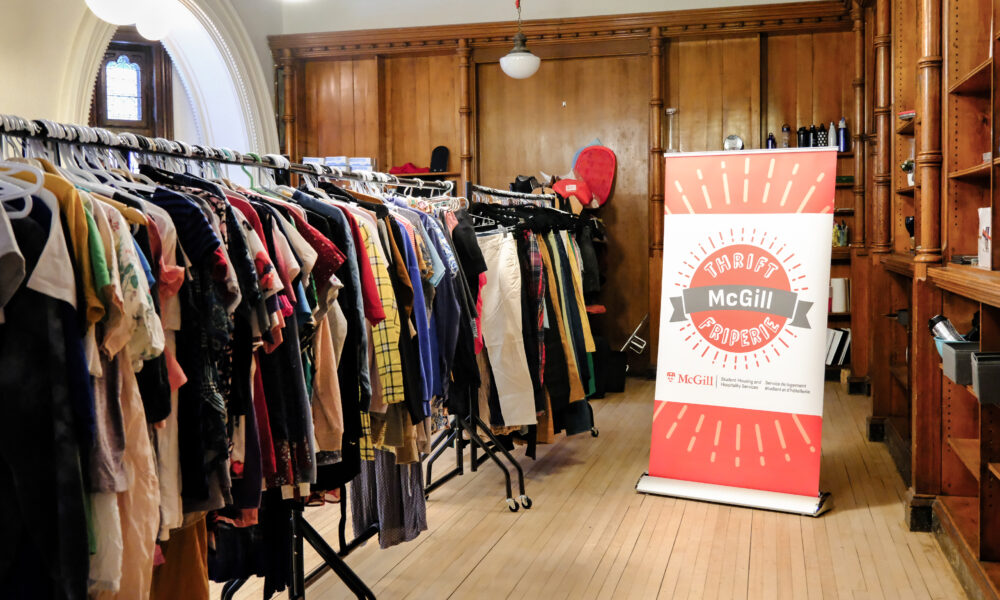In February, the Student Life and Learning and Student Housing and Hospitality Services celebrated three months since the opening of Thrift McGill, which was established with funding from the Sustainability Projects Fund (SPF). The store, located at 3473 Rue University, seeks to promote more sustainable shopping on campus by facilitating a way to reuse secondhand items.
Daniel Fournier, Associate Director of Residence Life, explained that Thrift McGill aims to reduce campus wastefulness through a “circular economy.” Fournier noted that wastefulness is particularly prominent in residences and in Milton-Parc, the popular student neighbourhood, where useful items get disposed of every year when students change housing arrangements.
“At its core, Thrift McGill promotes a circular economy, which means keeping items in use for as long as possible instead of sending them to landfills,” Fournier wrote to The Tribune. “A free store felt like the perfect solution to help address both issues: reducing waste while making quality items accessible to students.”
Fournier believes that Thrift McGill helps address socioeconomic barriers by providing access to essentials, like winter attire, for free. Fournier stated that this speaks to the store’s circular economy because, once the weather becomes warmer, those who took winter clothing can re-donate them.
“Our goal is to build a self-sustaining ecosystem where items circulate within the McGill community while also ensuring that any surplus is donated to local charities and thrift stores in Montreal,” Fournier wrote. “This way, nothing goes to waste, and we continue to extend the life cycle of everyday items in meaningful ways.”
Since its opening, Fournier stated that Thrift McGill has received over 1,600 donations from the McGill community and hundreds of visits from faculty and students alike last semester. Thrift McGill’s popularity has even led to a logistical issue, as the shop has received so many donations that they could not accept them all.
Nami Dwyer, U0 Science, has visited Thrift McGill on multiple occasions, and she believes that the store is conducive to more sustainable practices.
“I think [Thrift McGill] is a really good way for McGill to be sustainable because it really makes people aware when they come here. At the same time, it also supports the environment,” Dwyer said in an interview with The Tribune.
However, Dwyer noticed that McGill’s commitments to sustainability were also lacking in other areas.
“I’ve never really seen compost bins around campus,” Dwyer said. “In library areas, I only see recycling and garbage. I feel like it would be good to spread more awareness on that.”
As part of McGill’s Zero-Waste initiative by 2035, they intend to expand compost collection to all residences and to over 25 academic buildings. Currently, the administration has implemented pilot locations to ascertain how successful composting is.
In an email to The Tribune, Shona Watt, Associate Director of the McGill Office of Sustainability, wrote that she believes the McGill community will see more environmentally-focused initiatives in the coming years. In this academic year alone, 18 projects were approved or were in the process of being approved, ranging from community garden expansions to activism panels.
“We are thrilled that Thrift McGill is open and already loved and used by the community. The project has clear environmental, economic, and social benefits for everyone involved,” Watt wrote.
For Fournier, expanding Thrift McGill’s services is crucial to better accommodate whatever the McGill community may need.
“Our long-term vision is to expand Thrift McGill into a permanent, full-time fixture on campus,” Fournier wrote. “We’re also looking into collaborating with other sustainability-focused groups at McGill and possibly introducing seasonal pop-up shops, themed donation drives, and Residence Life programming to enhance the store experience.”









